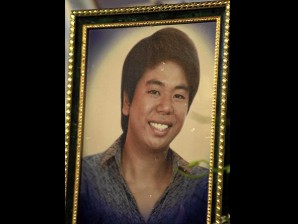
Invited to the hearing of the Senate committee on public order and dangerous drugs on proposed amendments to strengthen the Anti-Hazing Law, Reglos’ father, Lucito, said that up to now, almost six months after his death, De Lima had yet to deliver on her pledge.
The senate committee revisited the Reglos case after the death on July 30 of yet another San Beda law student, 21-year-old Marc Andrei Marcos, during reported hazing rites
Reglos, 25, died in February this year as a result of hazing rites linked to San Beda’s Lambda Rho Beta fraternity.
De Lima, a member of Lambda Rho Sigma, the sister sorority of the fraternity involved in Reglos’ death, had promised a full investigation of her “brods.”
But Reglos’ younger sister, Lorvie, told the committee the National Bureau of Investigation had failed to get the testimony of a vital witness—who was already at the NBI. The NBI has since stopped its investigation of the case.
“One of our problems is that many persons promised they would help like Justice Secretary Leila de Lima, who said that they would bare those involved, but until now, we have yet to be helped by ma’am Leila,” Lucito Reglos told the Senate panel chaired by Senator Gregorio Honasan.
Lorvie informed the Senate committee the NBI had stopped its investigation of the case.
“We stopped the NBI because our only witness in the case reported to the NBI … but it (the NBI) didn’t even get his statement,” Lovie said.
Fratmen, too
During the hearing, Senate President Juan Ponce Enrile told NBI Deputy Director Medardo de Lemos the bureau shouldn’t have stopped its probe even after the family withdrew the case from them.
Enrile said the crime involved the People of the Philippines and the NBI should have continued its investigation.
Honasan, tasked to come up with legislative proposals to crack down on violent fraternity initiations, however, is himself a fratman and believes a total ban on hazing is “too drastic and premature.”
Drastic and premature
“Banning hazing would be too drastic and premature at this time,” Honasan said in an interview after his committee’s first hearing on proposed amendments to the antihazing law.
Honasan, who incidentally lost a brother to fraternity hazing in the 1970s, said a long-term policy on the matter can’t be made based on emotions that are running high.
“I want to calibrate this. Every step must be in line with complete information,” Honasan said.
“We can’t be impulsive especially when it comes to long-term policy. Decisions can’t be made when we’re too happy or too angry,” said Honasan, who joined the Alpha Sigma Fraternity at the University of the Philippines.
Enrile, who said he became a fratman decades ago without having to go through physical abuse, pushed for initiations without “physical contact.”
No physical contact
Enrile told the Senate hearing there was no physical contact when he went through the initiations of the Sigma Rho Fraternity based at the University of the Philippines’ College of Law.
The only thing that they did to me was make me kneel, go to Ideal Theater, kneel down there and ask for alms,” Enrile said.
And then they made me eat one stick of cigarette. There was no physical contact as far as I can remember,” he added.
Enrile said there was also a supervisor, a senior member of the fraternity, who observed the rites to prevent injuries among the neophytes.
“We should prohibit physical contact … you can ask him to kneel, squat for several hours if you want to test his physical stamina,” Enrile said.
“But for lawyers to be killers or criminals themselves, they do not deserve to be lawyers, he said.
Former Senator Jose Lina, the author of Republic Act No. 8049 or the Anti-Hazing Law, told the committee that the law could use some amendments but expressed belief that the law was sufficient to address the problem of deadly initiation rites.
He blamed its “faulty implementation” for the continued proliferation of violent hazing.